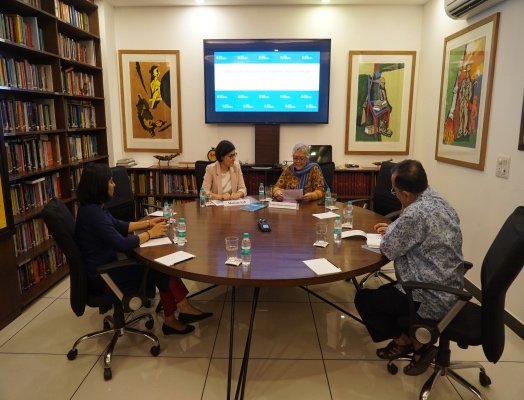New Delhi Launch | 'Afghanistan’s Peace Process': Evolution, Impact and Gaps | Women and Public Policy Journal [Vol. 3]
On 14 June 2018, IPCS hosted the launch of the 3rd Volume of the Women and Public Policy Journal (WPPJ), titled "Afghanistan’s Peace Process: Evolution, Impact and Gaps," published by the Organization for Policy Research and Development Studies (DROPS). The launch was followed by a discussion with Ms Mariam Safi, Executive Director, DROPS, and Editor-in-Chief, WPPJ. The launch and interaction was chaired by Ms Lalitha Kumaramangalam, Member, Governing Council, IPCS, and former Chairperson, National Commission for Women, India, and took place from 1415-1545 hrs in the IPCS Conference Room.
PROGRAMME
1415-1420 hrs | Opening Remarks by the Chair
By
Lalitha Kumaramangalam
Member, IPCS Governing Council; and Former Chairperson, National Commission for Women, India
1420-1440 hrs | Afghanistan’s Peace Process: Evolution, Impact and Gaps
By
Mariam Safi
Executive Director, Organization for Policy Research and Development Studies (DROPS)
1440-1545 hrs | Discussion and Q&A
1545 hrs | Tea
---------------------------
CHAIR & SPEAKER
Lalitha Kumaramangalam was Chairperson, National Commission for Women (NCW) from 2014 to 2017. She has extensive experience in working towards the empowerment and advancement of women from the vulnerable and underprivileged sections of society. She has worked on a range of issues such as healthcare and HIV/AIDS prevention, sex-workers, the LGBT community, migrant and construction workers, SHGs and urban slum women. Ms Kumaramangalam holds a Masters degree in Business Administration from the Madras University, and graduated with honours in Economics from St Stephen's College, Delhi.
Mariam Safi is the Co-Founder and Director, Organization for Policy Research and Development Studies (DROPS), Afghanistan. As one of the few female researchers in Afghanistan, she has led various in-depth research projects that have provided the first baseline data on some of these topics. She has also been a columnist at the Institute of Peace and Conflict Studies, India. Additionally, she is Member, Afghan Policy Group; Senior Research Fellow, Institute of National Security Studies, Sri Lanka; Resource Person, Lakshman Kadirgamar Institute for International Relations and Strategic Studies, Sri Lanka; and Peace-building Expert, Peace Direct, UK. Prior to co-founding DROPS Afghanistan, she served in various capacities, including as Deputy Director, Centre for Conflict and Peace Studies, Afghanistan.
---------------------------------------------------------
WOMEN AND PUBLIC POLICY JOURNAL
Launched in 2015, DROPS Afghanistan's 'Women and Public Policy Journal (WPPJ)' is the first peer-reviewed public policy journal to be authored by Afghan women in Afghanistan. The 2017 Edition of the WPPJ is titled ‘Afghanistan’s Peace Process: Evolution, Impact and Gaps’. The volume contains nine (9) research papers, three (3) case studies, and one (1) book review, authored by Afghan women. The essays examine nine contemporary peace and reconciliation related indicators such as: design of power-sharing agreements; holding talks; trust-building and legitimacy; role of transitional justice; balancing bottom-up approaches with top-down approaches; timing and sequencing of events; the spoilers issue; the role of the international community; and addressing the critical question of what peace means for citizens. To provide a yardstick for introspection and revision, two case studies involving peace processes of two different countries – Colombia and Northern Ireland – were studied and compared with the Afghan peace process.
These comparative studies illustrate simple but significant factors that have a bearing on how and why peace processes succeed or fail. The case studies offer insightful observations on the similarities, differences, and patterns involved in the peace processes in Colombia and Northern Ireland, and identify what worked and what did not – important lessons that Afghanistan could draw from. Offering insights on ways to address these gaps, the essays and case studies in this volume draw on theory, practice, and lessons learnt from other contexts to provide a clear illustration of the evolution, impact, and gaps in the Afghan peace process, and offer recommendations for remedies and improvement.
WPPJ (Vol. 3) | Table of Contents
- Political and Economic Inclusion: An Assessment of Women’s Participation in the Afghan Peace Process | Farhat Popal
- Afghan Peace Process: How to Improve the Chances for Success? | Shahgul Rezaie
- Peace Talks with the Taliban: Role of International Community | Fawzia Fazli
- Legitimacy, Peace Processes, and the Role of Civil Society | Zarghoona Aslami
- Compromise, Consensus-building and Trust: Missing Ingredients in Afghanistan’s Peace Negotiations | Marzia Meena
- Transitional Justice: A Prerequisite for Sustainable Peace? | Nazi Karim
- Insecurity in Afghanistan: A Destructive ‘Regional Security Systems’ Approach | Naheed Farid
- The Afghan Government’s Failures in Empowering Women in the Peace Process | Mona Hossaini
- A Key Gap in the Afghan Peace-building Process: Absence of Neuro-scientific Techniques and Human Psychology | Nahid Shahalimi
- Book Review: Talking to Terrorists How to End Armed Conflicts | Tahmina Rassoli
- Colombia’s Peace Process: Lessons for Afghanistan | Najiba Madadi
- Northern Ireland’s Peace Process: Lessons for Afghanistan | Farida Ghanizada



